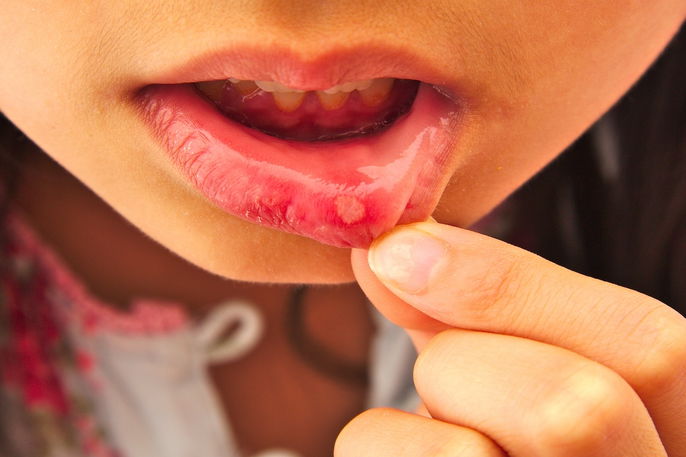Stomatitis is a condition characterized by the appearance of sores on the lips, tongue, gums and cheeks, similar to canker sores and ulcers. It can present a single sore or a cluster of sores that are painful, swollen and red.
This condition can occur as a result of blows and trauma to the mouth from brushing too hard, for example, or it can appear due to very acidic foods, nutritional deficiencies, bacterial infections or viral infections.
Treatment for stomatitis should be guided by a family doctor or dentist, and will vary depending on the severity of symptoms, the frequency with which they occur, and the underlying cause. The doctor may advise a change in eating habits, improved oral hygiene or the use of antiviral or antibacterial ointment with antiviral properties.

Common symptoms
The main symptom of stomatitis is the appearance of lesions around the mouth that resemble a cold sore or ulcer. These lesions are typically accompanied by other symptoms, such as:
- Pain around the sores
- Mouth sensitivity
- Difficulty eating, swallowing or speaking
- General malaise
- Mouth discomfort
- Swelling around the sores
- Fever
Furthermore, due to pain and discomfort, oral hygiene may not be performed as thoroughly, which can lead to foul breath or a bitter taste in the mouth.
If you notice any signs and symptoms of stomatitis, you are advised to consult a family doctor or dentist be consulted for assessment and treatment as needed.
Confirming a diagnosis
A stomatitis diagnosis should be confirmed by a family doctor or dentist, and is usually based on an assessment of the presenting signs and symptoms presented and the frequency with which they appear. The doctor will also consider the patient's person's habits and health history.
The doctor may also order lab tests to determine the underlying cause of the stomatitis, including a swab of the wounds or a scrape of some of the cells. The doctor may also order blood work to assess the patient's blood counts and vitamin or mineral levels.
Main causes
Stomatitis can be caused by several situations. The most common causes include:
- Using a toothbrush with very firm bristles
- Brushing your teeth or flossing too hard
- Using of orthodontic braces
- Eating very acidic foods;
- Nutritional deficiencies, such as iron, B vitamins, vitamin C and/or folic acid
- Chemotherapy
- Systemic diseases, such as Behçet's disease, inflammatory bowel disease or Kawazaki disease, for example.
Stomatitis can also occur due to a viral, fungal or bacterial infection. Infections caused by bacteria are often caused by bacteria that are naturally found in the body, but have overgrown due to reduced immune system functioning.
Viral infections that lead to stomatitis are also triggered by the herpes virus. This condition is also known as herpetic stomatitis, and is characterized by the appearance of sores in the mouth, redness and bleeding in the gums.
Treatment options
Treatment for stomatitis is done by cleaning the affected area every three hours. The doctor may advise rinsing your mouth with alcohol-free mouthwash, as well as maintaining a bland diet, with soft or cooked foods, to help reduce further injuries.
During flare-ups, you can reduce burning and discomfort with home remedies, like propolis or licorice extract applied on the sores.
However, if the sores are recurrent, you should consult a family doctor or dentist, as a viral infection may require prescription medication like acyclovir.
Stomatitis that is associated with a food hypersensitivity, a genetic factor or a weakened immune system, the doctor or dentist may prescribe triamcinolone acetonide to be applied to the lesion 3 to 5 times a day. It may also be beneficial to follow-up with a registered dietitian, so that a meal plan that reduces the frequency and intensity of stomatitis flare-ups can be developed.
Other precautions
When treating stomatitis, there are some precautions that you can consider to help speed-up recovery, such as:
- Maintaining adequate oral hygiene by brushing your teeth, flossing and using mouthwash several times a day
- Rinsing your mouth with warm water and salt
- Avoiding very hot foods
- Avoiding salty or acidic foods
- Avoiding touching or picking at the the sores
- Keeping the area hydrated
It is also important to drink plenty of water when treating stomatitis.






























